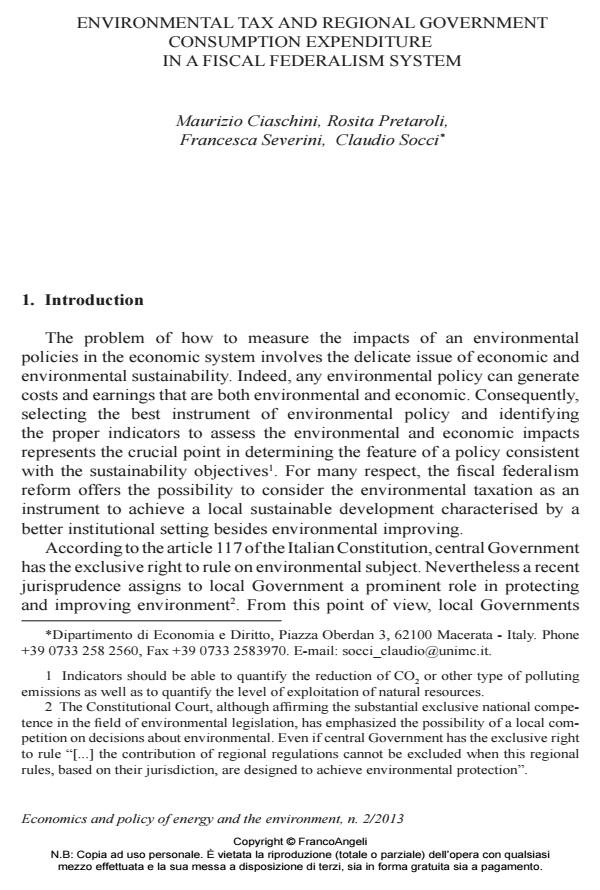Environmental tax and regional government consumption expenditure in a fiscal federalism system
Titolo Rivista ECONOMICS AND POLICY OF ENERGY AND THE ENVIRONMENT
Autori/Curatori Maurizio Ciaschini, Rosita Pretaroli, Francesca Severini, Claudio Socci
Anno di pubblicazione 2013 Fascicolo 2013/2
Lingua Inglese Numero pagine 24 P. 129-152 Dimensione file 989 KB
DOI 10.3280/EFE2013-002008
Il DOI è il codice a barre della proprietà intellettuale: per saperne di più
clicca qui
Qui sotto puoi vedere in anteprima la prima pagina di questo articolo.
Se questo articolo ti interessa, lo puoi acquistare (e scaricare in formato pdf) seguendo le facili indicazioni per acquistare il download credit. Acquista Download Credits per scaricare questo Articolo in formato PDF

FrancoAngeli è membro della Publishers International Linking Association, Inc (PILA), associazione indipendente e non profit per facilitare (attraverso i servizi tecnologici implementati da CrossRef.org) l’accesso degli studiosi ai contenuti digitali nelle pubblicazioni professionali e scientifiche.
The increasing attention to climate changes have led national Governments to design environmental tax policies able to face environmental problems and their associated economic consequences like as a negative change of GDP. The environmental taxation in particular is considered a powerful instrument of pollution control. More important, it provides public revenue that can be recycled at local level in order to attain the regional double dividend in a fiscal federalism framework. In this respect, we use a Computable General Equilibrium (CGE) model with imperfect labour market, to assess the regional effects of an environmental fiscal reform designed with the aim of reducing the CO2 emissions in a fiscal federalism setting. In particular, we introduce a local green tax on commodities output with a progressive structure. The tax burden depends on the commodity polluting power. According to fiscal federalism principles the tax revenue is collected by the local Government and it is entirely recycled to finance the local consumption expenditure. The application is done on a bi-regional Social Accounting Matrix for Italy and the results highlights the distributional effects of the reform on macroeconomic variables into the bi-regional income circular flow.
Parole chiave:Environmental taxation, Social Accounting Matrix, CGE analysis.
Jel codes:H23, D58, D57.
- RETRACTED ARTICLE: Assessing the nexus
between fiscal policy, COVID-19, and economic growth Tao Wang, Ke Gao, Chen Wen, Yuanzhi Xiao, Yan Bingzheng, in Environmental Science and Pollution Research /2022 pp.65289
DOI: 10.1007/s11356-022-20358-z - RETRACTED ARTICLE: It is time to control the worst: testing COVID-19 outbreak, energy consumption and CO2 emission Sajid Iqbal, Ahmad Raza Bilal, Mohammad Nurunnabi, Wasim Iqbal, Yazeed Alfakhri, Nadeem Iqbal, in Environmental Science and Pollution Research /2021 pp.19008
DOI: 10.1007/s11356-020-11462-z - The Multisector Applied Computable General Equilibrium Model for Italian Economy (MACGEM-IT) Claudio Socci, Francesco Felici, Rosita Pretaroli, Francesca Severini, Renato Loiero, in Italian Economic Journal /2021 pp.109
DOI: 10.1007/s40797-020-00127-y - Carbon and water footprint accounts of Italy: A Multi-Region Input-Output approach Yousaf Ali, Rosita Pretaroli, Claudio Socci, Francesca Severini, in Renewable and Sustainable Energy Reviews /2018 pp.1813
DOI: 10.1016/j.rser.2017.05.277 - Gender policy and female employment: a CGE model for Italy Francesca Severini, Francesco Felici, Noemi Ferracuti, Rosita Pretaroli, Claudio Socci, in Economic Systems Research /2019 pp.92
DOI: 10.1080/09535314.2018.1431612
Maurizio Ciaschini, Rosita Pretaroli, Francesca Severini, Claudio Socci, Environmental tax and regional government consumption expenditure in a fiscal federalism system in "ECONOMICS AND POLICY OF ENERGY AND THE ENVIRONMENT" 2/2013, pp 129-152, DOI: 10.3280/EFE2013-002008